You are here: Home » News » Jewish leaders at gathering of the Conference of Presidents of Major American Jewish Organizations express concerns about judicial reform
Jewish leaders at gathering of the Conference of Presidents of Major American Jewish Organizations express concerns about judicial reform
Knesset News, February 22, 2023
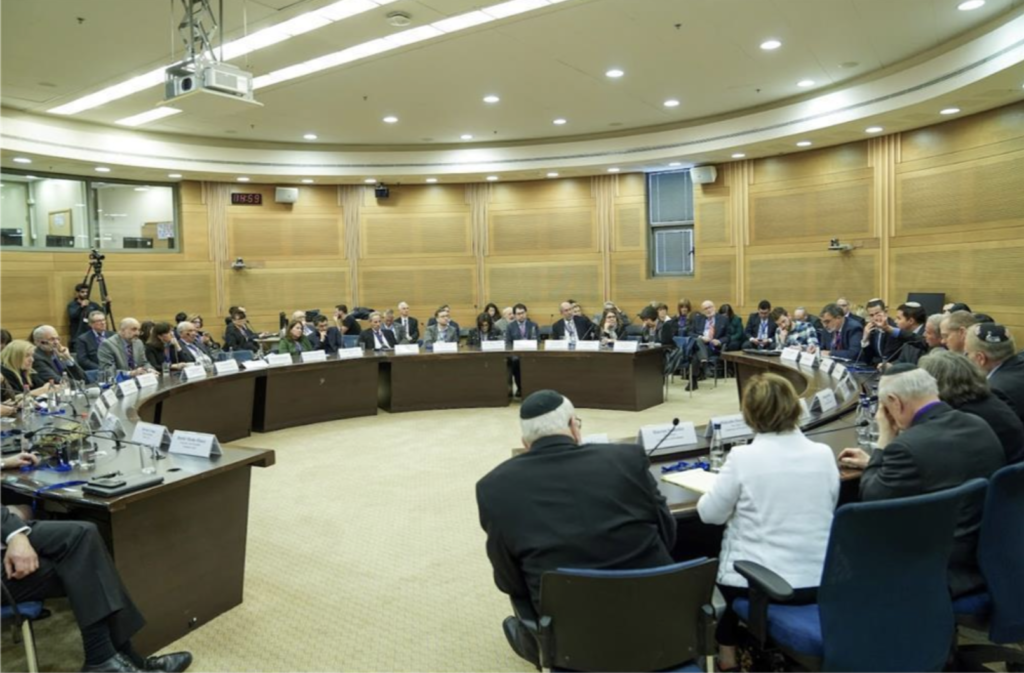
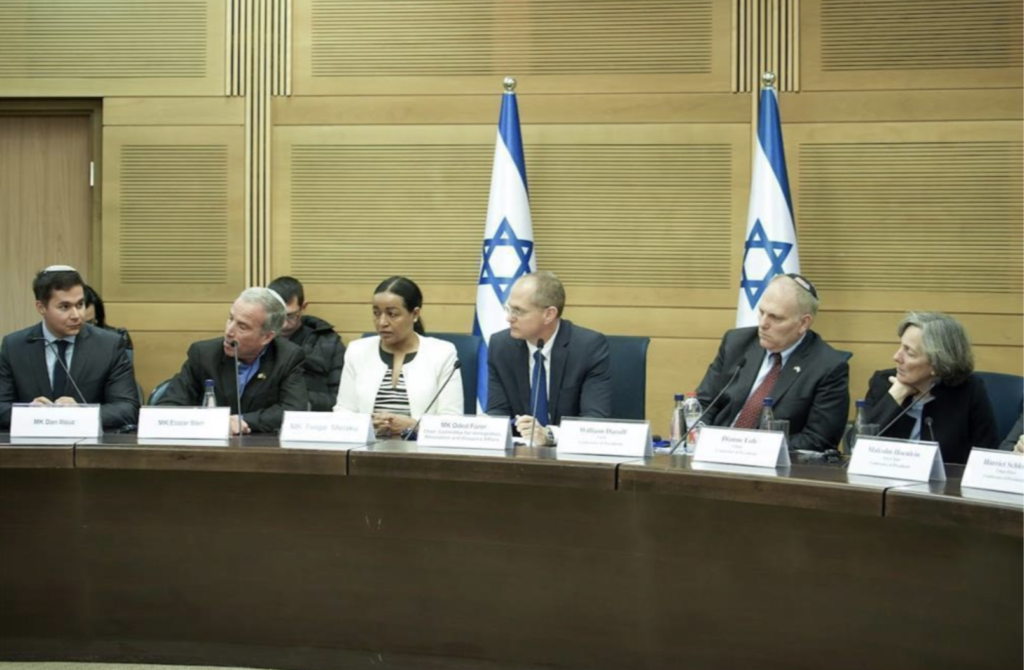
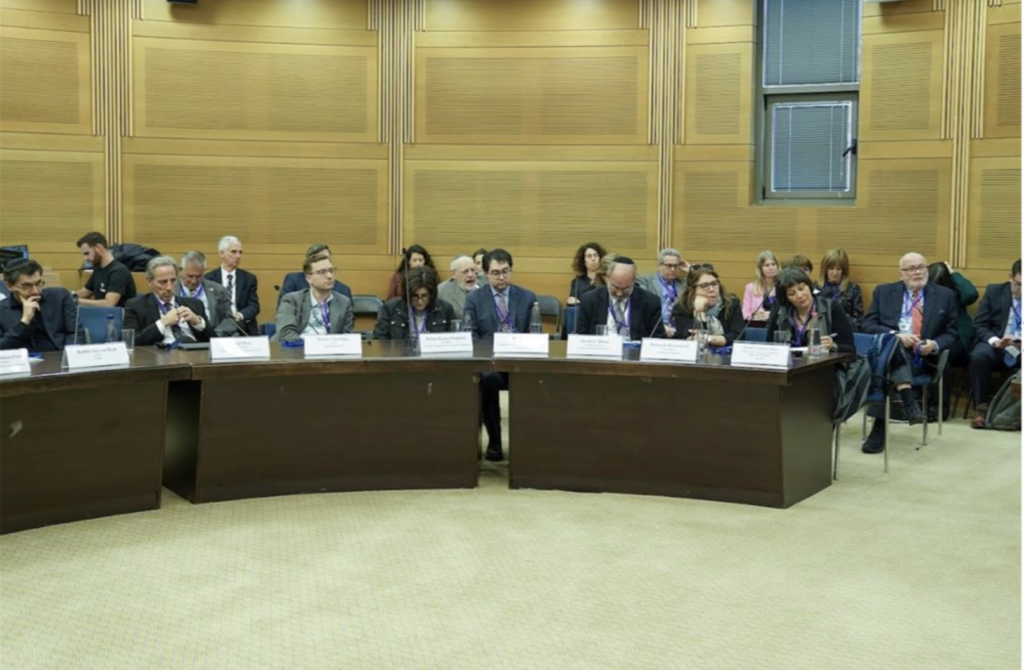
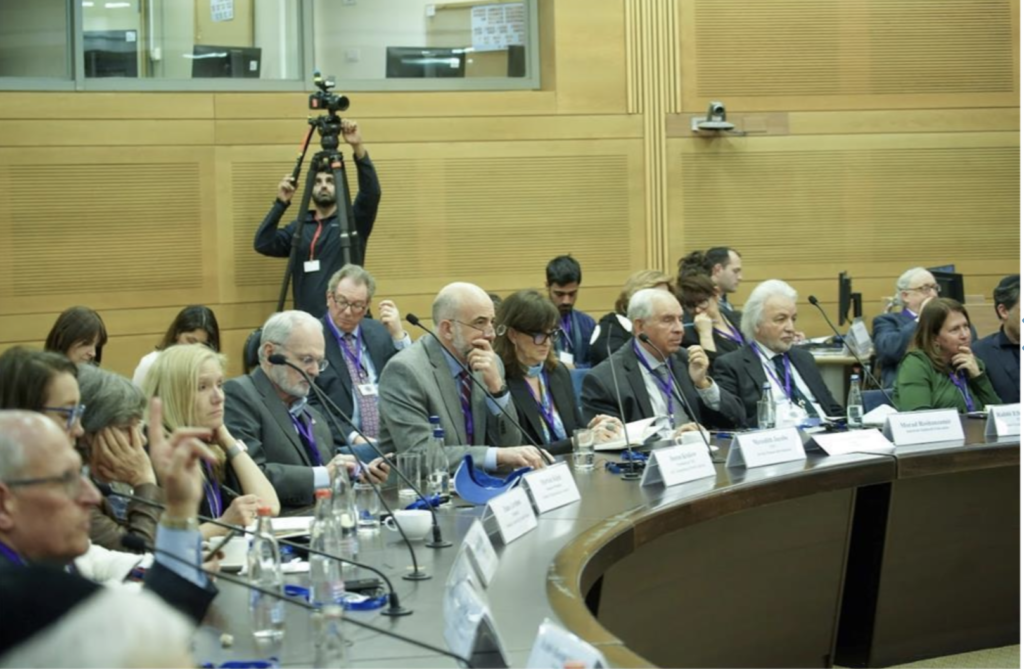
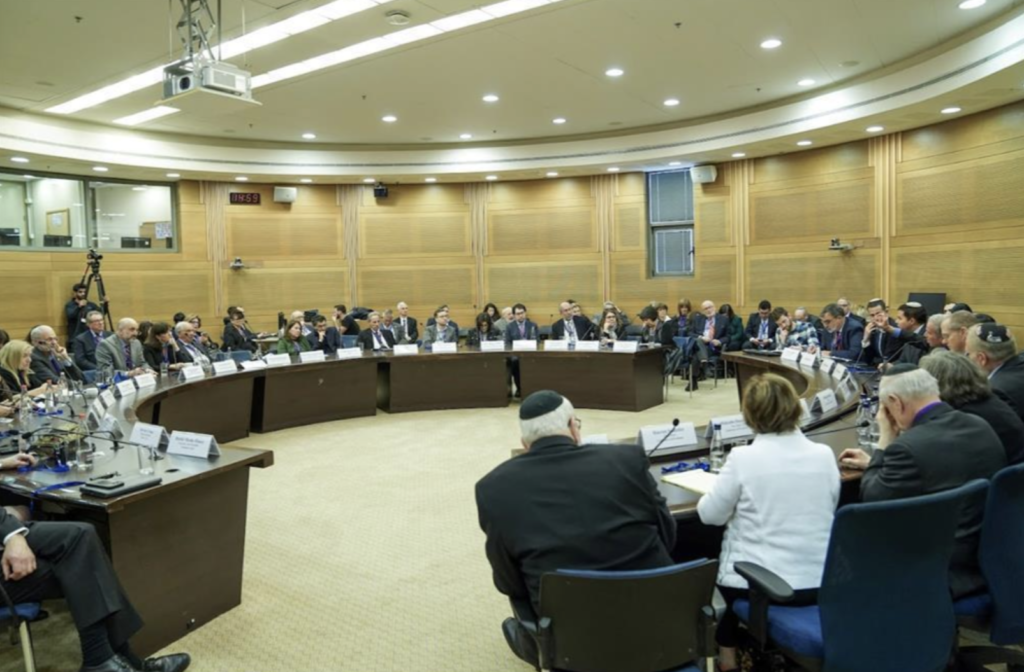
The Committee for Immigration, Absorption and Diaspora Affairs, chaired by MK Oded Forer (Yisrael Beitenu), convened on Tuesday for a meeting together with the Conference of Presidents of Major American Jewish Organizations (COP), on the occasion of the opening of the COP’s annual gathering. The discussion, which was held largely in English, addressed topical political issues on the agenda of Israeli society, including the judicial reform and the intention to change the “grandchild clause” [of the Law of Return].
Committee Chair MK Forer welcomed the COP members to the Knesset and thanked them for their support for Israel, saying: “From my point of view, the State of Israel belongs to the Jewish people that sits in Israel and all around the world. Because looking at what happened 78 years ago in Europe, when World War II ended, people understood that if the State of Israel had been established ten years before, for example, in 1938, there probably would have been no Holocaust of the Jewish people. This is, I think, the main goal that the State of Israel has—looking at the whole Jewish people, wherever there is a Jew all over the world.”
“I had a chance to talk to some of you before, and they said ‘Israel is our second home.’ I have to say, Israel is the first home for every Jew around the world, even if he is not living here, and even if he didn’t visit here at all. That’s how I would like to see the Jewish people feel, this is your home, and we need to make sure that you feel at home here,” MK Forer said.
Committee Chair MK Forer said that he was worried about the initiative to change the Law of Return. Regarding the coalition’s intention to carry out a reform in the justice system, MK Forer said: “This is the time for the coalition to say what compromise they are willing to make. They are leading now, they have the ability to legislate. They have the strong party in the parliament. If they are willing to compromise, we need to start from that. There are some principles that I cannot give up. Each branch of government needs to be independent; if we take the judicial branch and put it under the Government, that’s a huge problem in keeping Israel a Jewish and democratic state. Israel can’t stay here as a Jewish state if it isn’t democratic. We need to keep those two together. There is actually a struggle between the Zionist movement and the ultra-Orthodox movement. Tomorrow we’re going to vote here on legislation that will give more power to the rabbinical courts. This will be the start of making Israel more religious. We need judicial reform in Israel, we need to make some changes, but if you take all the solutions to the problem that anyone has ever thought about and put them together, you will finish off the court.”
Commenting on the Aliyah challenges faced by the State of Israel, Committee Chair MK Forer said: “We are in a very unique period. Looking at the absorption of Aliyah, especially from places like Russia and Ukraine, that’s a huge opportunity for Israel because usually the number is between 20,000–30,000 a year, of Olim from all over the world, but now we have huge numbers, of 75,000–80,000 per year. We’ve seen this in the past year. The big challenge of Israel is how to absorb them and to help them to stay here. We’re now facing a big difficulty in having enough teachers to teach them Hebrew in order for them to find work and stay here. But it’s a huge opportunity, because many of them are young people that come here, they come with skills, with university degrees, and it’s a huge opportunity for our market. Right now we have a major difficulty, because there isn’t enough money to absorb them and the Government is waiting to legislate the budget.”
Doron Krakow, President and CEO, JCC Association of North America: “We have been hearing calls for the American Jewish community to be heard on the subject of judicial reform. President Herzog has made significant overtures to convene the leadership both of the coalition and the opposition, in pursuit of a conversation that would yield a broader agreement about the necessary evolution of the justice system here, and as of yet we have seen no indication that there is a great desire to accept his invitation and to sit. I’m curious whether you [the MKs] would comment on the state of your commitment to pursuing by collaborative deliberation a proper outcome that will serve the interests of the state, and that we can proudly and passionately support as members of the Jewish people around the world.”
Rabbi Ellen Wolintz-Fields, Executive Director, Women’s League for Conservative Judaism: “I want my children to be able to come to Israel, and myself, and to pray where I want to pray. I have a love for Israel, I have a love for mitzvoth [Jewish commandments], and I want to be able to come here and know that perhaps I’ll have funding as a Masorti rabbi, equal with other rabbis. The largest group of Olim now are not Orthodox, they’re Conservative and Reform Jews, and we need a place for them too, because they’re not secular, they’re not Orthodox—they want to be observant, but the observant community here just pushes us away and shows no values of having any tolerance. I’m hoping you can show us where our place as Masorti Jews can be in this beautiful State of Israel.”
Dana Gershon, President, National Council of Jewish Women (NCJW): “I’m an attorney in the United States, and what I worry about in a constitutional system is the protection of minorities and vulnerable communities. What concerns me, and many of the 200,000 women across the United States that are members of NCJW, is the protection of those most vulnerable. I would like people to comment on how these reforms would keep and ensure [them], because in the US it would be checks and balances, and that’s what you might be removing here.”
Rabbi Moshe Hauer, Executive Vice President, Orthodox Union: “I want to express appreciation for the opportunity to be here together. We understand that politics has its own rules, and people take strong positions. Speaking for myself, the harm that is being caused here for us, as people who are involved in American Jewish organizations, is the impression which is being created by the political gamesmanship which is being played. I personally tend to lean more to the right, but I can’t understand at all a judicial reform which allows for a 61-vote majority. Anytime I ask anybody on the right side that would allow an override by a 61-vote majority, they all say, we don’t really mean for that to be the end point. It’s just a bargaining position. If that’s true, it should be said outright at the beginning. It should be said, we don’t intend to pass this as planned, we want to sit down to negotiate. And on the opposition’s side, the kind of language which is being used, such as the ‘death of democracy’ and ‘the beginnings of theocracy,’ which we feel is exaggerated and very harmful. American Jewry’s identification with Israel is very fragile, and all they need to hear is that. So the request is that you have this discussion, whatever the politics, recognizing the impact that it’s having on us.”
Rabbi Harold Kravitz, President of the Rabbinical Assembly: “In our [Conservative] communities, we see people with such strong commitments to Judaism and to Israel. And those who’ve chosen to make Aliyah, who are given such a hard time by the Interior Ministry. Let alone the Abayudaya in Uganda, who converted under our authority, and have absolutely been refused admission into the State of Israel as citizens. It’s unfathomable to us.”
MK Dan Illouz (Likud): “I was born and raised in Montreal, Canada; I made Aliyah 13 years ago out of Zionism. When I think about Israel-Diaspora relations, I think that sometimes part of the problem is that we focus on the things we disagree on, and we don’t focus on the many things that we not only agree on, but we should be very proud of what we have accomplished. In the past 75 years we have not only built a state, we also managed to create a dynamic economy, we have a country that now has relations with many Arab countries—things that we thought were completely impossible. We have a lot to be proud of, and you should also be proud of as Diaspora Jewry, because you should also take credit for a lot of these accomplishments, because you helped us get there. When it comes to non-Orthodox conversions, Israel is a coalition-based system. The Likud is much more liberal than the other parties that are in the coalition, and we would be much more keen to accept some things than some other coalition partners, especially the ultra-Orthodox parties. I think that we do find a balance that enables people who believe that their future and the Jewish people’s future are in line to find a way to integrate into Israel.”
MK Elazar Stern (Yesh Atid) said that Israel had given over issues of religion and state to the ultra-Orthodox: “Unfortunately, we gave the keys for entering the Jewish people to people some of whom have rejected the recognition of Israel as a Jewish state. And we gave them the right to decide who is Jewish and who is not. And this [judicial] revolution is going to damage even the achievements we have already made, which are not enough. Until a few years ago, it was only your problem overseas, but now it’s become a common problem for all of us together.”
MK Ohad Tal (Religious Zionism): “I have dedicated the past ten years of my life to strengthening the connection between the State of Israel and Diaspora Jewry. I’ve heard on many occasions that the Israeli Government doesn’t care about what Diaspora Jewry has to say, and I want to say here loud and clear, this is simply not true. We definitely care about what you have to say. I think we have a real need to have an open and brave dialogue. I think that if you understand the challenges we are facing, and we understand the challenges that you are facing—I want to hear about your challenges and how we as a Jewish state can take responsibility and really support your needs. So it has to be both sides. I think this is definitely the kind of conversation we want to have. Let’s have an open dialogue, not through the media—because we are one people, at the end of the day. I want to send a message from here, through you, to your communities, please tell them: We care. We want to have a dialogue, and let’s do that together.”
MK Tsega Melaku (Likud): “We have a problem with the Israeli political system. Within 3.5 years, we’ve had elections five times. We need a dialogue, as President Herzog said, we have to talk. But the opposition still doesn’t want to sit and talk about that. In my opinion, we have a big responsibility. We have one country, this is our home. I was born in Ethiopia, and I made Aliyah when I was 16. It’s a small country, with many ethnic groups, and a lot of political parties. We have to live together. That’s my vision; we can solve everything.”
MK Moshe Solomon (Religious Zionism): “I made Aliyah to Israel from Ethiopia due to the desire to live in a Jewish and democratic state. However, I’m aware that most of the Jewish people doesn’t live in Israel. Over the generations, it was our common denominator as Jews that preserved us over 2,000 years of exile. Every Jew in the world wants the State of Israel to be independent and sovereign. That’s exactly what we’re trying to do in the current Government, without harming the various streams of Judaism throughout the world.”






